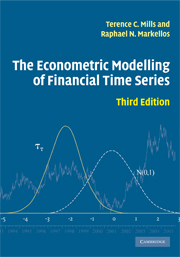Book contents
- Frontmatter
- Contents
- List of figures
- List of tables
- Preface to the third edition
- 1 Introduction
- 2 Univariate linear stochastic models: basic concepts
- 3 Univariate linear stochastic models: testing for unit roots and alternative trend specifications
- 4 Univariate linear stochastic models: further topics
- 5 Univariate non-linear stochastic models: martingales, random walks and modelling volatility
- 6 Univariate non-linear stochastic models: further models and testing procedures
- 7 Modelling return distributions
- 8 Regression techniques for non-integrated financial time series
- 9 Regression techniques for integrated financial time series
- 10 Further topics in the analysis of integrated financial time series
- Data appendix
- References
- Index
5 - Univariate non-linear stochastic models: martingales, random walks and modelling volatility
Published online by Cambridge University Press: 05 June 2012
- Frontmatter
- Contents
- List of figures
- List of tables
- Preface to the third edition
- 1 Introduction
- 2 Univariate linear stochastic models: basic concepts
- 3 Univariate linear stochastic models: testing for unit roots and alternative trend specifications
- 4 Univariate linear stochastic models: further topics
- 5 Univariate non-linear stochastic models: martingales, random walks and modelling volatility
- 6 Univariate non-linear stochastic models: further models and testing procedures
- 7 Modelling return distributions
- 8 Regression techniques for non-integrated financial time series
- 9 Regression techniques for integrated financial time series
- 10 Further topics in the analysis of integrated financial time series
- Data appendix
- References
- Index
Summary
As we have seen in previous chapters, financial time series often appear to be well approximated by random walks. The relationship between random walks and the theory of efficient capital markets was briefly discussed in chapter 1, where it was argued that the random walk assumption that asset price changes are independent is usually too restrictive to be consistent with a reasonably broad class of optimising models; what is in fact required is that a variable related to the asset price be a martingale (see, for example, Andreou, Pittis and Spanos, 2001).
Martingales and random walks are discussed formally in section 5.1, with tests of the random walk hypothesis being the subject of section 5.2. The relaxation of the assumption that changes in a time series must be independent and identically distributed allows the possibility of examining non-linear stochastic processes, and the remainder of the chapter therefore introduces various non-linear models that are now used regularly in analysing the volatility of financial time series – a fundamental concern of financial modellers. Ways of measuring volatility itself are introduced in section 5.3, before formal stochastic models are considered. Stochastic volatility (SV) models are discussed in section 5.4, ARCH processes in section 5.5, further models related to ARCH in section 5.6, and section 5.7 briefly looks at the forecasting performance of alternative volatility models.
- Type
- Chapter
- Information
- The Econometric Modelling of Financial Time Series , pp. 151 - 205Publisher: Cambridge University PressPrint publication year: 2008

